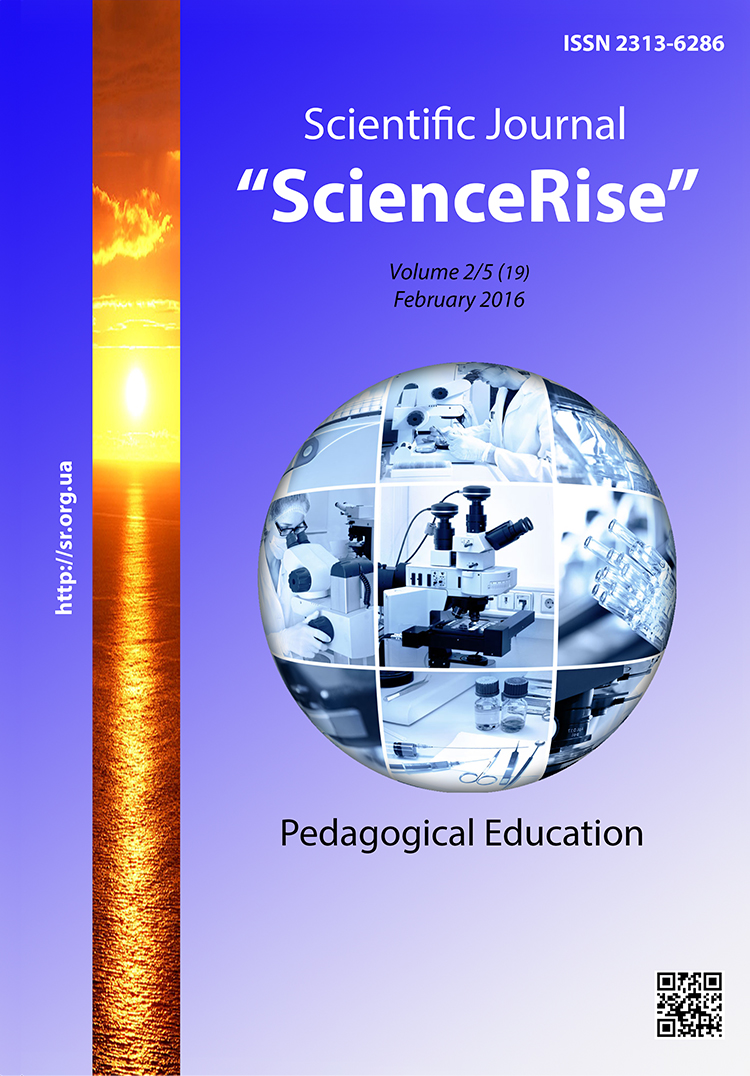Innovative model of sports support of the high education for students with disabilities
DOI:
https://doi.org/10.15587/2313-8416.2016.60902Keywords:
student with disabilities, nosology, physical training, sport, sports supportAbstract
There was experimentally grounded the sports support of high education for students with disabilities. In experiment took part students with nosologies of: vision, hearing, locomotive system and CSIP, with somatic diseases and diabetes mellitus. The special attention was paid to organizational and methodological aspects of physical training and sports of students with different nosologies. There was proved than every student with disabilities has certain peculiarities and functional limitations that complicate the processes of education in integrated environment and socialization. For guaranteeing the equal access to education for such people it is necessary to introduce in educational process the special methods, programs, pedagogical technologies and adaptive technical means. There was demonstrated an effectiveness of the new model of physical training for students with disabilities in pedagogical process of the modern IHE
References
Iermakov, S. S., Ivashchenko, S. N., Guzov, V. V. (2012). Features of motivation of students to application of individual programs of physical self-preparation. Physical education of students, 4, 59–61.
Nosko, N. A. (2009). Increasing the level of physical activity as a factor of strengthening of health of pupils and students. Bulletin of the Chernihiv state pedagogical University. T. G. Shevchenko, 69, 144–150.
Tomenko, A., Lazorenko, S. (2010). Level of somatic health and motive activity of students of higher educational institutions. Slobozhansky scientific and sport Bulletin, 2, 17–20.
Vinnik, D. P. (Ed.) (2010). Adaptivnoe fizicheskoe vospitanie i sport. Kyiv: Olympic Literature, 608.
Boiko, G. N. (2010). The criteria of psychological effectiveness of the implementation of the system of psychological and pedagogical support in sports of persons with disabilities. Pedagogics, psychology, medical-biological problems of physical training and sports, 2, 23–26.
Evseev, S. P. (2010). Adaptive physical culture in rehabilitation and social adaptation of persons with disabilities. Chep. 1. Physical culture and sport in modern society. Smolensk, CAPXT, 11–17.
Adyrkhaev, S. G. (2013). Organizational-pedagogical bases of physical education of students with special needs in higher education. Kyiv: University "Ukraine", 381.
Apanasenko, G. L, Dolzhenko, L. P. (2007). The health and physiological reserves of the body. Theory and methodology of physical education and sport, 1, 17–21.
Shevtsov, G. A. (2009). Systematic approach to the organization of integrated education for students with limited activity in higher educational establishment. Social-pedagogical rehabilitation of educational institutions: problems and prospects. Khmelnitsky, HTUU, 22–24.
Adyrhajev, S. G. (2013). Fizychna kul'tura v zhytti studentiv z obmezhenymy mozhlyvostjamy zdorov’ja. Pedagogika, psyhologija ta medyko-biologichni problemy fizychnogo vyhovannja i sportu, 12, 3–9. doi: 10.6084/m9.figshare.879634
Gruzevich, T. Y., Vorobyov, M. I., Bezverkhnii, G. V. (2011). Control picname vihaan children, pdldf I molodi: uaichalni posebni. Kyiv: Olimpiska literature, 224.
Shark-Eckardt, M., Piece, M., Zakowska, H., Iermakov, S. S. (2012). Substantiation of increase of motor activity of disabled people living in the Kujawsko-Pomorskie region. Physical education of students, 3, 136–144.
Adyrkhaiev, S. G. (2014). Psychophysical condition of visually impaired students during physical education classes. European Scientific Journal,10 (3), 62–69.
Adyrkhaiev, S. G. (2014). Optimization of the motor activity of students suffering from diabetes mellitus during physical education classes. European Scientific Journal, 10 (6), 72–81.
Bondar, T. I. (2014). Developing the inclusive setting in higher education institutions in Ukraine. Science and Education a New Dimension. Pedagogy and Psychology, II (27), 20–24. Available at: http://seanewdim.com/uploads/3/2/1/3/3213611/bondar_t.i._developing_the_inclusive_setting_in_higher_education_institutions_in_ukraine.pdf
Downloads
Published
Issue
Section
License
Copyright (c) 2016 Сослан Георгиевич Адырхаев

This work is licensed under a Creative Commons Attribution 4.0 International License.
Our journal abides by the Creative Commons CC BY copyright rights and permissions for open access journals.
Authors, who are published in this journal, agree to the following conditions:
1. The authors reserve the right to authorship of the work and pass the first publication right of this work to the journal under the terms of a Creative Commons CC BY, which allows others to freely distribute the published research with the obligatory reference to the authors of the original work and the first publication of the work in this journal.
2. The authors have the right to conclude separate supplement agreements that relate to non-exclusive work distribution in the form in which it has been published by the journal (for example, to upload the work to the online storage of the journal or publish it as part of a monograph), provided that the reference to the first publication of the work in this journal is included.

